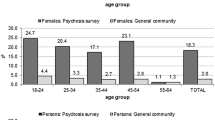Abstract
Three studies are briefly reviewed as contributions to the epidemiology of violence and mental disorder. The samples were severally drawn from a then substantial regional pre-trial prison, a national high security hospital service and a general psychiatric hospital with a mainly local clientele. Delusions emerged consistently as having an important role in the precipitation of a violent act by a person with a psychotic illness; the more serious the act, the more delusions appear to have had a direct role. Nevertheless, given that delusions are very common symptoms of psychosis, but serious violence by someone with psychosis is unusual, other mediating factors must be operating. There is some support each for an interactional effect with other symptoms of the psychotic process, an influential effect on further symptom, – particularly affective symptom – development and at least two social relationship mechanisms. This augurs well for a shift from hitherto primarily observational work to hypothesis-generated research.
Similar content being viewed by others
Author information
Authors and Affiliations
Rights and permissions
About this article
Cite this article
Taylor, P. When symptoms of psychosis drive serious violence. Soc Psychiatry Psychiatr Epidemiol 33 (Suppl 1), S47–S54 (1998). https://doi.org/10.1007/s001270050209
Issue Date:
DOI: https://doi.org/10.1007/s001270050209




